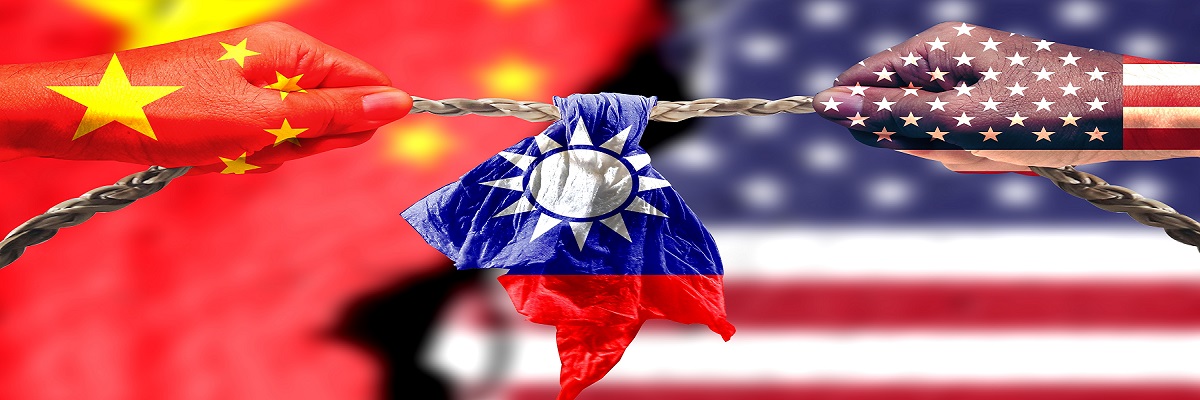Diplomacy
When Giants Wrestle: The End of Another Round of Tensions Between the United States and China?

Image Source : Shutterstock
Subscribe to our weekly newsletters for free
If you want to subscribe to World & New World Newsletter, please enter
your e-mail
Diplomacy

Image Source : Shutterstock
First Published in: Feb.12,2024
Feb.23, 2024
How are the fluctuating tensions between Washington and Beijing over Taiwan expected to affect Israel?
The ongoing strategic rivalry between the two superpowers—the United States and China—is the most important geostrategic factor of our time. The two countries are vying for technological dominance and control over resources, that will shape our future, and infrastructure that is critical for civilian, economic, and military purposes. The United States and China are also competing for global influence by forming partnerships and trying to influence world order, including its values, institutions, and mechanisms that regulate it. Can they shape the rules of the competition between them without spiraling into a military conflict that would have devastating global consequences? Taiwan may be the most volatile flashpoint in the complicated relationship between the two powers. For China, the “reunification” with Taiwan is one of its “core interests”—a top objective and a flagship issue in its foreign policy. Although the United States has repeatedly declared that it is committed to the “one China” policy, it is also an ally of Taiwan. The United States has warned China to refrain from making unilateral, aggressive moves vis-à-vis Taiwan, while supplying Taiwan with military resources to deter China and prevent a forceful takeover. Since assuming power in 2013, President Xi Jinping of China has repeatedly emphasized Taiwan’s unification with China as a key objective. During a meeting with President Joe Biden in November 2023, President Xi said that China “prefers” a peaceful unification, but he did not dismiss the use of force. On the eve of Taiwan’s 2024 elections, President Xi further stated that unification is “inevitable.” The tensions between the powers over Taiwan had escalated following the previous elections on the island in 2020. During this period, senior American officials visited Taiwan, and the United States and Taiwan signed weapons deals in August and September of that year, followed by a marked increase in Chinese military aircraft penetrating the island’s air defense identification zone and crossing the “midline” between the island and mainland China. China’s perception of encirclement was further heightened by the United States’ strengthening of its alliances and initiatives in the Indo-Pacific region (such as QUAD, AUKUS, and IPEF) and by the increased diplomatic pressure exerted on China, through boycotting the 2022 Winter Olympics and protesting its human rights record. But even during this period, despite rising tensions, the two nations maintained ongoing communications, including the Alaska talks in March 2021—although they were notably tense—and the meeting between the presidents in November of that year. The tension peaked in April 2022, when then Speaker of the US House of Representatives Nancy Pelosi announced her intention to visit Taiwan. China strongly protested, and the White House even recommended Pelosi to reconsider her visit due to concerns about potential military escalation. Pelosi refused and proceeded with her visit in August, delivering a speech at the Taiwanese legislature and advocating for increased American–Taiwanese cooperation. In an article published in the United States before her visit, Pelosi wrote that “at a time when the world faces a choice between autocracy and democracy . . . it is essential that America and our allies make clear that we never give in to autocrats.”

In response to Pelosi’s visit, China held a large-scale military exercise that disrupted air and maritime traffic in the region and released a white paper emphasizing “The Taiwan Question and China’s Reunification in the New Era.” Furthermore, as a countermeasure to Pelosi’s visit, the Chinese Ministry of Foreign Affairs announced that it was suspending all dialogue and cooperation with the United States, including dialogues between the military commands, the ministries of defense (DPCT), and the maritime military coordination (MMCA), and cooperation in the fields of illegal immigration, criminal legal assistance, transnational crimes, counternarcotics, and climate change. In November 2022, presidents Biden and Xi met in Bali, Indonesia, in an attempt to put the relations between the two powers back on track. After the meeting, the White House issued a statement announcing that the United States will continue to compete actively with China, but the two countries must manage their competition responsibly, without letting it escalate, while maintaining open channels of communication and continuing to cooperate on global issues such as climate change, counternarcotics, debt relief, health, and food security. Regarding Taiwan, the United States reiterated its commitment to the one China policy but strongly opposed China’s aggressive actions, which violate peace and stability in the Strait and in the entire region. The Chinese also released a statement, noting that President Xi highlighted that Taiwan is a core Chinese interest and constitutes a red line that is nonnegotiable in the relations between the two countries. It was anticipated that the year 2023 would begin on a more positive tone, with US Secretary of State Antony Blinken’s scheduled visit to China in February. The visit was canceled when a Chinese balloon was discovered floating over US territory for a week until the US Air Force intercepted it. Although the White House at first tried to downplay the incident, with President Biden initially referring to it as a “minor breach” and said that the Chinese government was unaware of the issue. China claimed that a weather monitoring and research balloon had strayed off course. Public pressure, however, led the administration to cancel Blinken’s visit. Subsequently, the US Department of Commerce imposed restrictions on six Chinese companies linked to balloon and aviation technologies that are used by the Chinese military, requiring that they receive special approval to access American technology. In April and May, China retaliated at a relatively low bar by imposing sanctions on a US member of Congress who visited Taiwan and sentenced an American citizen living in Hong Kong to life imprisonment, for alleged espionage for the United States. These actions reflect the efforts of both China and the United States to take focused, restrained measures, to avoid escalating tensions. The absence of a strong reaction from China to the establishment of a select committee within the US House of Representatives, focused on examining the US–China strategic competition, suggests that China sought to prevent further escalation of the conflict.

Efforts to end the crisis and restore talks were renewed in May 2023 when the head of the CIA met with his Chinese “counterparts.” In June, US Secretary of Defense Lloyd Austin and Chinese Minister of Defense Wei Fenghe met on the sidelines of the Shangri-La conference in Singapore. Secretary of State Blinken’s anticipated visit to China took place later that month. In July, US Special Envoy for Climate John Kerry and Secretary of the Treasury Janet Yellen traveled to China, followed by a visit of US Secretary of Commerce Gina Raimondo in August. These high-level meetings concluded on a note of cautious optimism, with both sides acknowledging “progress” but not a “solution,” as the purpose of the meetings was to stabilize relations rather than to resolve the issues in dispute. In September 2023, Secretary of the Treasury Yellen and Chinese Finance Minister He Lifeng launched two new working groups on economic and financial issues. Moreover, Pentagon officials and their Chinese counterparts met and discussed the US Department of Defense’s cyber strategy, followed by a meeting of the American and Chinese presidents in San Francisco in November. The American efforts to renew the military dialogue between the two countries was initially met with refusal by China until December, when General Brown, the chairman of the Joint Chiefs of Staff, spoke with his Chinese counterpart General Liu Zhenli. In early January 2024, a few days before the elections in Taiwan, the annual Defense Policy Coordination Talks between the two countries were held at the Pentagon for the first time in four years. These developments reflect China’s acute sensitivity toward the Taiwan issue and its willingness to take significant measures against perceived violations of its One China Policy, especially by the United States. Despite numerous disputes, the growing rivalry between them, the defiant measures, and the reciprocal sanctions, these events highlight that the two powers recognize the importance of keeping channels of communication open. This dialogue is crucial for pursuing shared interests, resolving disputes, and minimizing the risk of military escalation that could have far-reaching consequences for both nations as well as the global community. The ongoing tension between the United States and China over Taiwan also has implications for Israel. First, the increasing friction between the powers has accelerated the formation of two opposing camps and has limited Israel’s ability to maneuver between them. As demonstrated (again) since the outbreak of the war between Israel and Hamas, the United States is Israel’s greatest friend and its most important strategic ally. While China is an important economic partner of Israel, its policy is not that of a friend, and its oppositional stance toward Israel has the potential to cause significant damage. The United States expects its allies to stand by its side and to align more closely with its policies vis-à-vis China, especially concerning advanced technologies and critical infrastructure. Failing to meet US expectations could strain US–Israel relations. Second, a military escalation between the United States and China would also have global economic consequences, seriously disrupting supply chains of raw materials and essential goods crucial to Israel. Finally, the US administration recently linked the military aid granted to Israel to that of both Taiwan and Ukraine, framing them as three democracies under threat. While this linkage underscores the US commitment to its allies, it also creates constraints and interdependencies. The attention and resources that the United States currently allocates to Israel and to the broader challenges in the Middle East could be compromised if the United States faces serious military crises elsewhere in the world, and this could have far-reaching impacts on Israel.
First published in :

Ofir Dayan is a research assistant in the Israel-China Policy Center at INSS. Ofir studied for an MIA in International Security Policy and a BA in International Relations at Columbia University as a part of a fast-track program, earning both degrees in five years. During her MIA she served as a Graduate Advisor to the State Department, as a Teaching Assistance in Columbia’s School of International and Public Affairs, and as an intern for the INSS. Ofir is a columnist for Makor Rishon, formerly for Yediot Ahronot and Israel HaYom and is a frequent contributor to Israeli and American newspapers, radio and TV stations.

Shahar Eilam is a senior researcher at the INSS, and a member of the Diane & Guilford Glazer Foundation Israel-China Policy Center. Shahar served in the IDF for 26 years in positions involving intelligence gathering and intelligence research. Shahar holds a B.A. in Economics and Middle East History, and an M.A. in Public Policy from Tel Aviv University.
Unlock articles by signing up or logging in.
Become a member for unrestricted reading!